
Craps is a dice game in which players bet on the outcomes of the roll of a pair of dice. Players can wager money against each other or against a bank. Because it requires little equipment, "street craps" can be played in informal settings. While shooting craps, players may use slang terminology to place bets and actions.
Blinds are forced bets posted by players to the left of the dealer button in flop-style poker games. The number of blinds is usually two, but it can range from none to three. When there are two blinds they are called the small blind and the big blind.
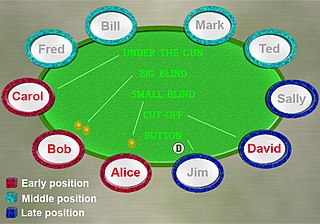
In the game of poker, the play largely centers on the act of betting, and as such, a protocol has been developed to speed up play, lessen confusion, and increase security while playing. Different games are played using different types of bets, and small variations in etiquette exist between cardrooms, but for the most part the following rules and protocol are observed by the majority of poker players.

Texas hold 'em is one of the most popular variants of the card game of poker. Two cards, known as hole cards, are dealt face down to each player, and then five community cards are dealt face up in three stages. The stages consist of a series of three cards, later an additional single card, and a final card. Each player seeks the best five-card poker hand from any combination of the seven cards: the five community cards and their two hole cards. Players have betting options to check, call, raise, or fold. Rounds of betting take place before the flop is dealt and after each subsequent deal. The player who has the best hand and has not folded by the end of all betting rounds wins all of the money bet for the hand, known as the pot. In certain situations, a "split pot" or "tie" can occur when two players have hands of equivalent value. This is also called "chop the pot". Texas hold 'em is also the H game featured in HORSE and HOSE.
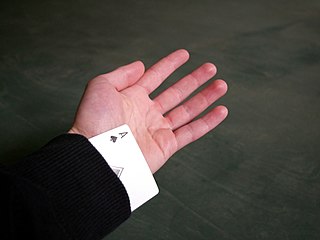
Cheating in poker is any behavior outside the rules of poker that is intended to give an unfair advantage to one or more players.

A poker tournament is a tournament where players compete by playing poker. It can feature as few as two players playing on a single table, and as many as tens of thousands of players playing on thousands of tables. The winner of the tournament is usually the person who wins every poker chip in the game and the others are awarded places based on the time of their elimination. To facilitate this, in most tournaments, blinds rise over the duration of the tournament. Unlike in a ring game, a player's chips in a tournament cannot be cashed out for money and serve only to determine the player's placing.
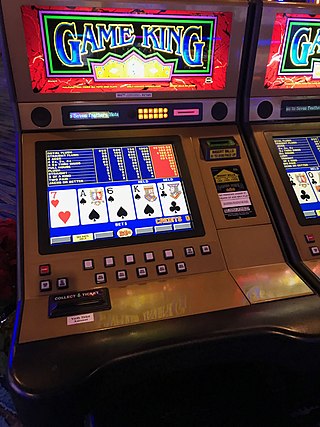
Video poker is a casino game based on five-card draw poker. It is played on a computerized console similar in size to a slot machine.
Caribbean stud poker, also called casino stud poker, is a casino table game with rules derived from five-card stud poker. However, unlike standard poker games, Caribbean stud poker is played against the house rather than against other players. There is no option to bluff or deceive as this is played against the house and not other players.
A big bet (BB) is the larger of two fixed bet amounts in a fixed-limit poker game. A big bet is used in the final rounds of a game to increase the pot amount and thereby enable the possibility of a bluff. Big bets are generally double the wager of the initial or small bet. Any multi-round poker game can use big bets to standardize wagers while maintaining a sufficient risk-ratio to encourage bluffing. Casino poker tables use big bets to set a limit to the amount of money a patron can lose in each wager.
In poker, bad beat is a subjective term for a hand in which a player with what appear to be strong cards nevertheless loses. It most often occurs where one player bets the clearly stronger hand and their opponent makes a mathematically poor call that wins with any subsequent dealing to complete the hand.

High Stakes Poker is an American cash game poker television program. The poker variant played on the show is no limit Texas hold 'em. The first four seasons ran from January 16, 2006 to December 17, 2007 on GSN. The next three seasons ran from March 1, 2009 to May 21, 2011, and was simulcast in 3DTV on N3D. The show was revived on December 16, 2020 on PokerGO.
Rake is the scaled commission fee taken by a cardroom operating a poker game. It is generally 2.5% to 10% of the pot in each poker hand, up to a predetermined maximum amount. There are also other non-percentage ways for a casino to take the rake.
The table limit is the minimum and maximum bet that a gambler can make at a gaming table. It is a form of yield management in that the limits can be changed to optimize the profit from a gaming table. Gaming tables have a limited resource to sell: the seats used by the players.
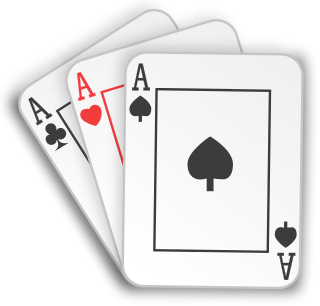
Teen patti is a gambling card game. Teen Patti originated in India and is popular throughout South Asia. It originated in the English game of three-card brag, with influences from poker. It is also called flush or flash in some areas.

Cash games, also sometimes referred to as ring games or live action games, are poker games played with "real" chips and money at stake, often with no predetermined end time, with players able to enter and leave as they see fit. In contrast, a poker tournament is played with tournament chips worth nothing outside the tournament, with a definite end condition, and a specific roster of competitors.
The following is a glossary of poker terms used in the card game of poker. It supplements the glossary of card game terms. Besides the terms listed here, there are thousands of common and uncommon poker slang terms. This is not intended to be a formal dictionary; precise usage details and multiple closely related senses are omitted here in favor of concise treatment of the basics.
Draw poker is any poker variant in which each player is dealt a complete hand before the first betting round, and then develops the hand for later rounds by replacing, or "drawing", cards.
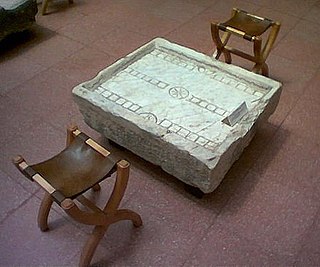
Gambling in Italy has existed for centuries and has taken on many forms. Its dates back to the days of the Roman Empire, when the predecessor of the modern game of backgammon, Ludus Duodecim Scriptorum, became popular among Roman legionnaires. It is also due to them that the game came to other European countries.

Open-face Chinese poker, OFCP, commonly known as Open Face Chinese or OFC, is a variant of Chinese poker where players receive five cards to start and then one card at a time until each player has a 13 card hand legal or not. The game originated in Finland during the mid-2000s and spread to Russia a few years later. Professional poker player Alex Kravchenko, who is credited with introducing the game to the Russian high-stakes community, describes the game as "spreading like a virus". The game was introduced to the United States in 2012.










